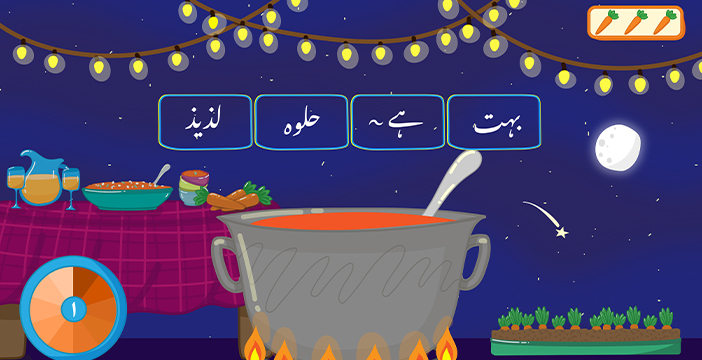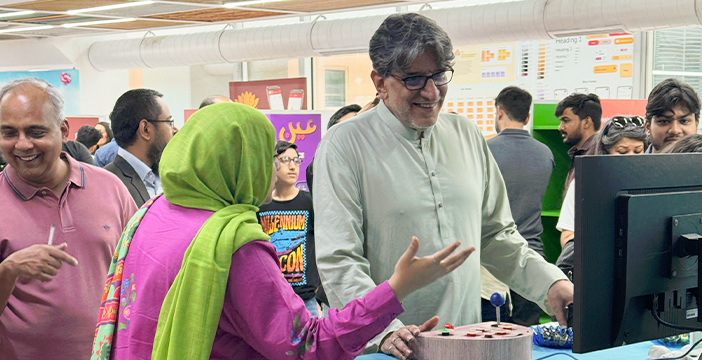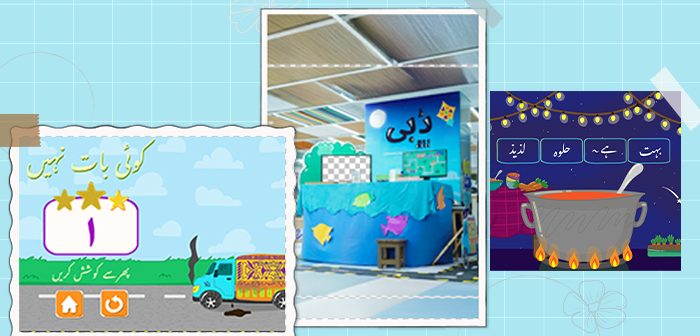When I joined Habib University in 2021, I never imagined that my thesis project would center around Urdu language learning, let alone teaching it. Raised in Dubai, Urdu was spoken at home but never taught formally. I could understand it conversationally, but reading and writing were unfamiliar territories—until I took Jehan-e-Urdu, a mandatory course in the Habib Liberal Core Curriculum.
What began as a requirement soon became a transformative journey. I learned to write basic words like peeche and neeche, and eventually read Urdu literature. I discovered the language’s rhythm, emotion, and cultural richness. That experience sparked a question: What if children had better tools to learn Urdu from an early age?
That question led to my final year thesis project: Dibi – Huruf Abad Edition.
What is Dibi?
Dibi is a play-based Urdu learning console designed for children aged 5 to 9. It connects to a screen and uses large tactile inputs—buttons, a joystick, and a slider—to make learning Urdu interactive and fun.
Initially, I aimed to create a screen-free Urdu learning tool, but research and expert interviews revealed that screens are here to stay. So, I reimagined the interaction: instead of removing screens, I made them physical, joyful, and developmentally active.

The game world of Gajar Ka Halwa that explores sentence structure in a festive nighttime setting.
The Game World of Huruf Abad
At the heart of Dibi is a game pack called Huruf Abad, featuring five original games:
- Truck ka Safar – Builds spelling and word formation skills.
- Machli ka Jaal – Enhances vocabulary through a matching fish game.
- Mithu ka Bol – Teaches sound recognition with a talking parrot.
- Patang ki Uraan – Improves grammar as a kite flies higher with correct answers.
- Gajar ka Halwa – Explores sentence structure in a festive nighttime setting.
Each game is designed with a specific Urdu language learning goal, blending familiar cultural elements with modern, clean visuals. The console’s tactile controls turn passive screen time into active, hands-on learning.

The game world of Truck Ka Safar that builds spelling and word formation skills.
Building Dibi — A Collaborative Effort
Dibi was not a solo endeavor. I collaborated with:
- Habib University developers who coded the games in Unity.
- A dedicated teammate who helped prototype the physical console using Arduino.
- My family, mentors, and classmates, who tested prototypes and offered feedback.
- Parents and children, who participated in usability testing.
This project pushed me to wear many hats—researcher, designer, hardware developer, and storyteller—and helped me grow in ways no other project had.
A Showcase to Remember
Just days before our final thesis showcase, political tensions between Pakistan and India led to a postponement. But when the event was rescheduled, it became the highlight of my Habib journey. Children played joyfully, professors asked thoughtful questions, and even the university president offered kind words.
That day, I realized Dibi wasn’t just a university project—it was a potential tool for improving Urdu literacy across Pakistan.

Haya Imtiaz explaining her Final Year Project to President Wasif Rizvi
Looking Back—and Ahead
Dibi reflects everything I’ve learned at Habib University—about design, language, identity, and play. It helped me reconnect with my culture and language, and I hope it can do the same for future generations.
As I graduate with the Class of 2025 from the Communication & Design program, I leave with more than a portfolio piece. I leave with a renewed love for Urdu, confidence in my creative process, and a dream to build more tools that make language learning joyful and accessible—especially for children.
About the Author
Haya Imtiaz is a Communication and Design graduate (Class of 2025) with a passion for playful, human-centered design. A visual thinker from Dubai, her work blends storytelling, identity, and language through illustration, interaction design, and game-based learning. Her final project, Dibi—a learning console for kids—reflects her love for creativity, accessibility, and impact.




